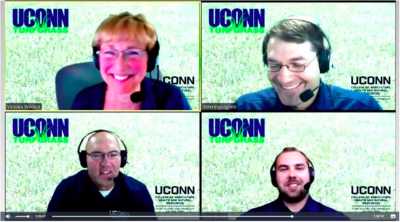Program Leader: Victoria Wallace, Extension Educator
The Connecticut School IPM Coalition was formed to support School and Municipal Grounds Managers with turf care and landscape practices following the statewide ban of pesticides on daycare and K-8 school properties. Coalition members annually develop and present in-person educational workshops for school grounds and athletic field managers and their staff on maintaining grounds and fields without the use of pesticides. Assessment tools and methods to determine the impact of the management and quality of school grounds and athletic fields have been developed to better serve school grounds managers. The state of Connecticut requires the use of an IPM plan for care of all school grounds and athletic fields, even if the school managers are obligated to manage and care for these properties without the use of pesticides.
A day-long School IPM educational workshop was planned for August 2020, but was cancelled due to COVID-19. However, UConn IPM Program team members Victoria Wallace and Alyssa Siegel-Miles continued to produce Extension documents that benefit school ground managers. Also, the UConn turfgrass faculty developed and presented a virtual field day on August 18, highlighting turfgrass research that would be valuable to school grounds managers and other turfgrass professionals in CT. Research presentations included: strategies to enhance bio-fungicides that reduce turfgrass disease; effect of turfgrass species, seeding rate, and mowing height on weed populations during and post turfgrass establishment; low input turfgrass evaluation trials; and Solvita tests to guide N fertilization. 96 people attended the webinar. Pesticide credits were awarded.
100% of the attendees who completed the evaluation after the virtual event felt that the content of the research presentation was relevant to turfgrass maintenance programs. 100% of the attendees rated the program good to excellent.

answer session during a virtual presentation.
2020 Turf Field Day Workshop Attendee Comments
Thank you! It was very good and more interesting than in-person field days, as they do not allow you to get an overhead look at the research projects.
Well done, well presented and worth the time staring at a computer screen. Was good to see actual footage of what was being discussed.
Very informative, to the point, and insightful. You have set the bar pretty high for the rest of the virtual programs.
A survey was developed and distributed in the fall of 2020 to CT grounds managers and staff to better understand the impact of COVID-19 on turf and grounds maintenance practices performed by school grounds managers and how best to deliver extension support. UConn faculty also sought to determine and identify changes to the educational and technical support needed as a result of COVID-19.
Survey results indicated that 100% of respondents were considered essential employees during the pandemic; 24% of respondents experienced staffing levels that were normal for the season, while 73% of respondents had a percentage of their staff furloughed or working mandatory reduced or modified hours. 45% reported that staffing changes/loss of staff impacted the maintenance of their municipal/school properties, while 55% reported that there was no impact. 35% stated that staff hours have been staggered so fewer staff are working at one time or that some staff duties have been redirected to disinfecting, sanitizing, or other duties not related to turf/grounds care. Of the respondents who experienced reductions in staff hours, 18% had adjusted maintenance practices by re-directing care to only heavily used fields or higher profile locations, while 37% had altered their mowing, fertilizer, and/or overseeding schedules. 25% of respondents reported that they had been able to complete normal maintenance in the spring 2020, but planned projects for fall 2020/spring 2021 or new equipment purchases were put on hold. 58% of respondents have already experienced or expect to experience future budget cuts as a result of the pandemic.